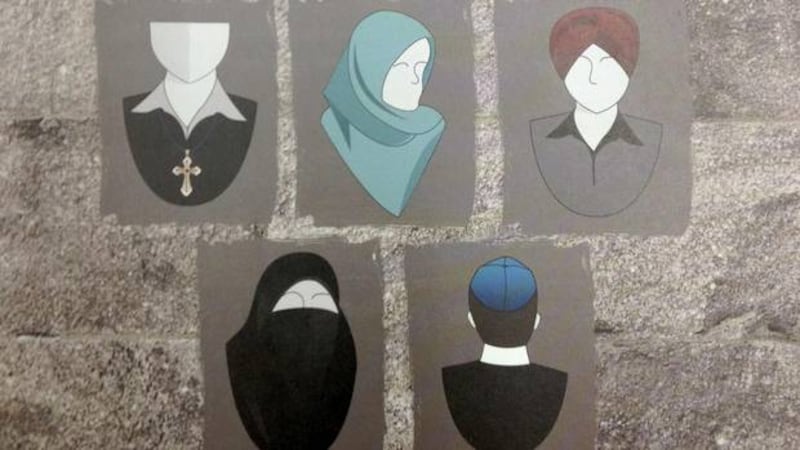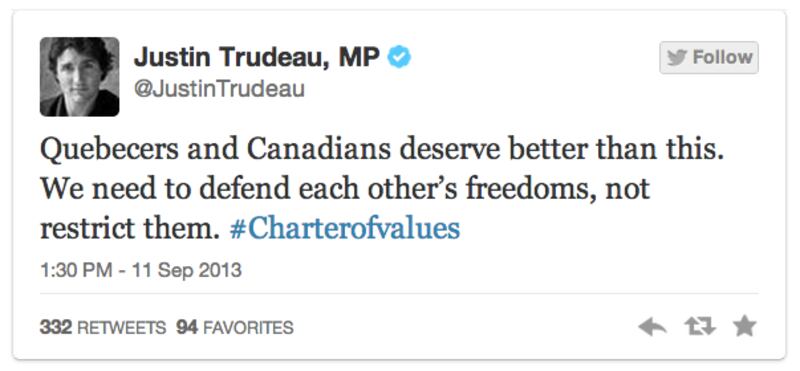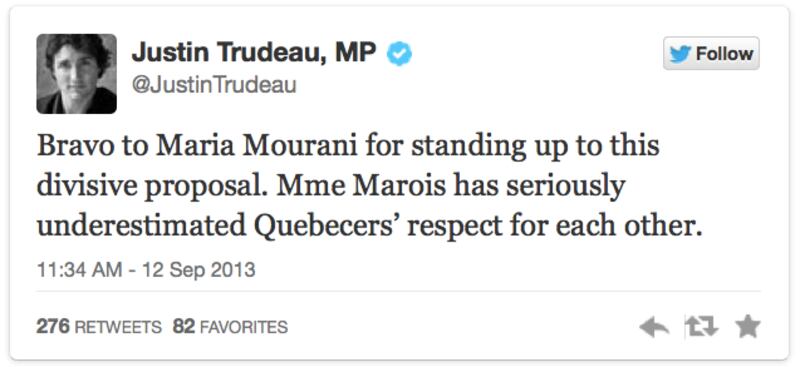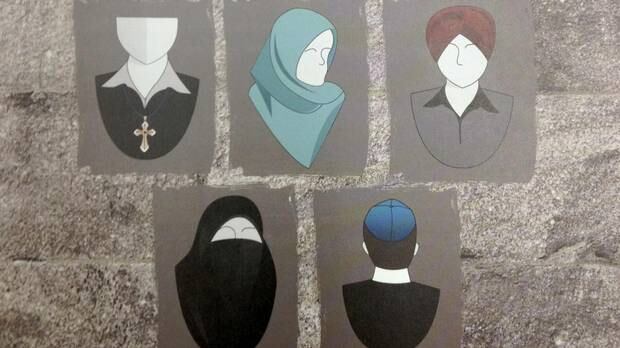It’s only been a week since Quebec’s government released its Charter of Values—a proposal that would bar public workers from wearing conspicuous religious symbols—but the province’s religious communities are already finding common cause in the struggle against it.Spearheaded by Premier Pauline Marois, the leader of the ruling Parti Québécois, the charter is presented as a means of promoting gender equality and religious neutrality in a part of Canada that bears a uniquely fraught relationship to religion. Yet its method of creating a secular society is being deemed discriminatory, xenophobic, and downright unconstitutional by experts around the country.

Under the Charter of Values, public employees like teachers and doctors would be forbidden to wear any of the “ostentatious” religious symbols shown above. Smaller—and, it’s worth noting, much rarer—objects, like a ring bearing the Jewish Star of David or earrings bearing the Muslim crescent, would be permitted.
Polls show the charter has boosted the Parti Québécois’s popularity and has won strong support in Quebec’s outlying regions, lending credence to the notion that this proposal is Marois’s way of currying favor in those ridings. But it’s sparking a public outcry in the province’s two biggest cities, Montreal and Quebec City. It’s also eliciting some pretty clever and creative responses from Canadians at large. Here are 10 favorites.
1. Multi-faith protests
Thousands took to the streets of Montreal on Saturday to protest the charter. The multi-faith march drew large numbers of Muslims and Sikhs, some of whom wore headscarves fashioned out of the Quebec flag and carried placards with slogans like “Keep Calm and Love Your Hijab.”

Due to a scheduling oversight, the protest was held on Yom Kippur, leading to a relatively small Jewish turnout. But this protest promises to be just the first of many—which means it’s only a matter of time until we see placards proclaiming “Keep Calm and Love Your Kippah.”
2. Cartoons
In this National Post cartoon, Steve Murray takes the charter one step further, imagining what else it might ban for going against the province's values. (Personal favorite: “Tea or skin color darker than two milks.”)

3. Satirical videos
This great satirical clip shows a mother sending her daughter off to school on a freezing Quebec morning. The girl’s dressed for the weather, but her mom insists she take off her winter garb, lest she be mistaken for a Muslim—oops, an adherent of “a religion which we cannot name”—while her dad cheerfully reminds them, “Secular Quebec!”
The follow-up video is also pretty inspired.
4. Savvy ad campaigns
While Quebecers were wringing their hands over the charter, one Ontario hospital decided to use it to its own advantage. Lakeridge Health in Oshawa put out this recruitment ad, hoping to lure health workers away from Quebec to their own institution.

For many Quebecers, the ad hits a raw nerve: it evokes the possibility that this charter will result in a brain drain like the one that followed the 1995 referendum on sovereignty.
5. Political calculations
Various politicians, most notably Liberal leader Justin Trudeau, are cleverly (which is not to say disingenuously) capitalizing on the furor over the charter. By positioning himself as one of its most outspoken critics—in tweets, videos, and op-eds—Trudeau is leveraging it in a way that stands to give the federal Liberals a political leg-up.

As the National Post noted, the charter is handing Trudeau “an issue to hammer at as he goes up against New Democrat leader Thomas Mulcair in search of Quebec,” although “both leaders have issued ringing declarations of opposition.”
6. Dissension in the ranks
In a gutsy interview on Wednesday, Member of Parliament Maria Mourani criticized the charter and called it a “political miscalculation” on Marois’s part. The Bloc Québécois, the federal counterpart to the Parti Québécois, then proceeded to kick her out of its caucus. But Mourani stood by her comments, quitting the party on Friday. Of course, Justin Trudeau lost no time in congratulating her on Twitter.

7. Intellectual interventions
A group of 91 Quebec intellectuals penned a manifesto entitled “Our Values Exclude Exclusion,” explaining why they categorically reject the charter. The highly respected Canadian philosopher Charles Taylor also came out against it—for example, in the below French-language interview. Oh, and when nine legal experts were asked to weigh in on the charter’s constitutionality, they opposed it by a count of 9-0.
8. Casseroles
Some Montrealers, remembering last summer’s pots and pans (“casseroles”) protests against tuition hikes, once again took to the streets of the Mile End neighborhood mid-week with their kitchenware in hand. Because this noise-making tactic is by now so beloved, chances are it’s going to get a lot more play in the next few weeks.

9. Feminist takedowns
Feminist organizations like the Quebec Women’s Federation have flat-out rejected the charter, refusing to buy into the notion that it promotes women’s rights. On a theoretical level, the Parti Québécois assumption that “woman in hijab” necessarily equals “female oppression,” and that barring hijabs from the public sector necessarily equals feminist victory, is deeply problematic. On a practical level, there’s the fact that this law would quite simply discriminate against many women in the workplace. “Doing away with religious symbols will only make valuable jobs for believing women disappear,” noted QWF president Alexa Conradi in that organization’s French-language response.

10. Sporting symbols in solidarity
In newspaper op-eds, comment boards, and social media platforms, Quebecers have suggested that anyone who works in the public sector, whether or not they’re religiously affiliated, should don one of the “ostentatious” religious symbols as a sign of protest. So, for example, Multiculturism Minister Jason Kenney changed his Twitter profile picture to a photo that shows him wearing a Sikh headscarf. And Esti Mayer, a Jewish woman writing in the Montreal Gazette, said she would wear a hijab for a day and invited all women to follow her lead. Though some may feel uncomfortable with such expressions of solidarity insofar as they raise the specter of cultural appropriation, Quebecers have wielded this tactic to good result in the past. They may well do so again in the very near future.






